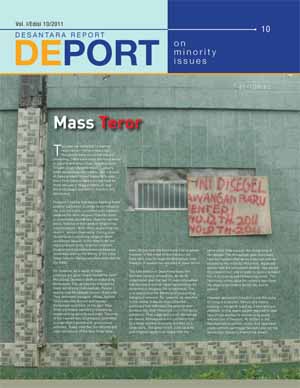This year we celebrate 13 years of reformation. Thirteen years ago the people were out on the streets protesting. There were mass demonstrations in Jakarta and other cities. Students from Trisakti University were killed in Jakarta while demanding reformation. The outcome of these protests forced Soeharto to step down from the presidency he had held for thirty two years. Mass protests all over the archipelago shouted for freedom and
democracy.
However it seems that we are heading down another path when it comes to our religious life. It is not a path consistent with freedom,because the term religious freedom itself is understood pejoratively. Over the last ten
years, violence in the name of religion has only increased. Quite often, and across the country, people cheer while closing down churches and punishing religious sects considered deviant. In the New Order era mass protests using religious (Islamic) slogans were labeled subversive because Islam was seen as the enemy of the state.
Today Islamic masses are often defended by the state.
For instance, as a result of mass pressure the government issued the Joint Ministerial Decree in 2008 on disbanding Ahmadiyah. This decree was followed by mass terrorizing of Ahmadiyah. People approached Ahmadiyah houses of worship. They destroyed mosques, offices, burned holy books (the Qur’an) and injured Ahmadiyah members. In the past, New Order politicians handled protestors by implementing security and order. The voice of the masses was suppressed, controlled in order that it accord with government activities. Today, now that the security and
order structures of the New Order have been dismantled, the people are free to speak. However in the midst of this freedom we have seen how, through the Ahmadiyah case, freedom of speech has resulted in mass terror.
The 10th edition of Deport examines the thematic issue of Ahmadiyah. As we all understand, over the last 10 years Ahmadiyah has become a central issue representing the dynamics of religious life in Indonesia. This is a snapshot of the dilemma of unremitting (religious) violence. For instance, as reported in the media, it depicts how collective sentiment has infiltrated the government/ bureaucracy, and influenced ulama (religious scholars). They judge and punish Ahmadiyah en masse. Ahmadiyah is not just terrorized by a large number of people, but also on a
large scale. The government, political elite and religious leaders all speak with the same voice: they support the disbanding of Ahmadiyah. The Ahmadiyah case illustrates how the freedom that exists today can only be
enjoyed by the majority. Minorities, especially groups that are considered deviant, may accept this freedom but only in order to exist in a realm full of terrorizing and threatening voices. The Testimony in this issue for instance describes the experience Umar’s family has had to endure.
However democratic freedom is not the same as living in a vacuum. Democracy means existing in the same realm as others who are different. In this realm we are required to take care of one another to ensure unity exists
without loss of freedom. As written in the Representation section, voices that have been made uniform can trigger fascism, and not the democratic freedom of which we dream.

